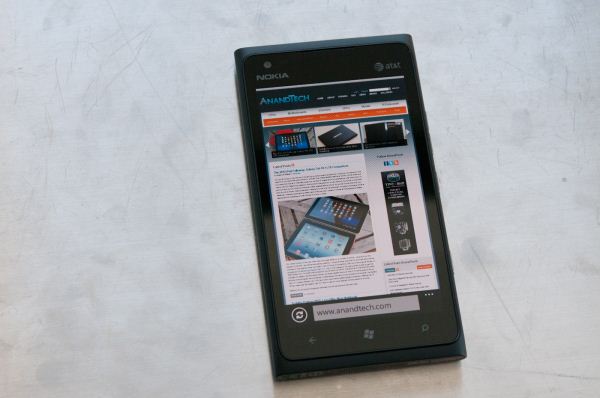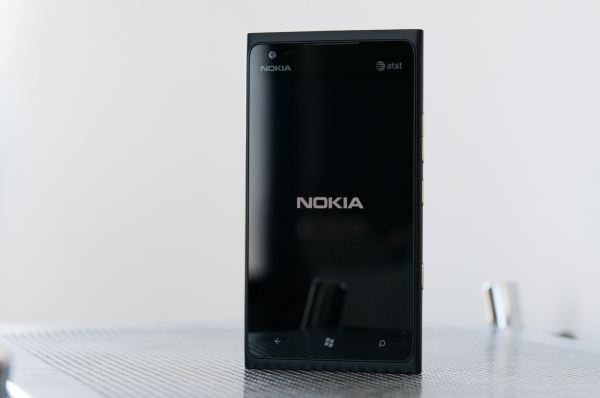Nokia Lumia 900 Review - Windows Phone with LTE
by Brian Klug on April 3, 2012 9:00 PM ESTSumming up the Lumia 900 as a device is pretty easy, it's superficially a beefed up, larger Lumia 800. Spelled out explicitly, the changes are a larger 4.3" SAMOLED+ display with a full RGB stripe, a front facing 720p camera, and LTE connectivity for AT&T. When it launches later in Europe, instead of LTE, the Lumia 900 will bring DC-HSPA+ and all around improved cellular connectivity courtesy MDM9200. The Lumia 900 is thinner, but obviously larger in x and y to accommodate the larger display, but in the hand and pocket the difference isn't all that huge. The end result is a device I can find only positive things to talk about with, and it's the Lumia that finally rounds out Nokia's complete entrant Windows Phone lineup.
For the first time in a while, I'm genuinely excited by a new Windows Phone. With the Lumia 900, it seems as though some of Nokia's rhetoric about being the first OEM to put its best hardware and design forward with the platform is starting to ring true. Similar to our take on the first members of the Lumia family, the 900 is easily the best Windows Phone on the market today.
The $99 launch price is absolutely crazy and very welcome for a flagship phone, particularly one with such high build quality and camera standards. Not only does this obviate other Windows Phones, but it increases competitive pressure on Apple as well as Android smartphone providers. I don't know that there's still a lot of iPhone/Windows Phone cross shopping, but a trend towards even cheaper on-contract prices for high-end smartphones is absolutely welcome.
What we really need to see from Nokia is faster hardware and more power efficient LTE, both of these things are technically possible today (28nm LTE basebands are still not quite available in volume yet) however it's up to Microsoft to actually enforce the platform change. It's amazing what Nokia has been able to do hardware-wise with only a year in the Microsoft camp, particularly when you remember that most smartphone development cycles are in the 12 - 24 month range. While the Lumia 900 is a great Windows Phone today, what will really be interesting is what Nokia will be able to pull off with a full design cycle under its belt.
The Lumia 900 launch in the US is, like I stated before, obviously a big deal for Nokia, and putting its best devices on the table with the 900 makes sense, even if the initial Lumia 710 introduction was something of a puzzling first step. While it's a big deal for Nokia to be launching a flagship phone in the US once more, it really isn't as much of a make or break thing for the Windows Phone 7 platform in general, and that brings me to my next point.
Ultimately the Lumia 900 doesn't really change the balance of power in the smartphone OS competition as it stands right now. Although the version number has advanced on the Lumia 900 (because of changes that needed to accommodate LTE), it's really the same Windows Phone 7.5 Mango we've seen and talked about before. If you're looking for a make or break launch that might upset the balance, wait for the Apollo update.
As it enables dual-core SoCs, the Apollo update leads to our continued plea to Microsoft: please throw better hardware at the Windows Phone platform. No company ever won by being the slowest. Windows Phone may be an extremely efficient platform (it is), but there are only good things to come from combining software efficiency with bleeding edge hardware. Microsoft has learned tremendously from Apple in this regard, but in order for Windows Phone to be more than a third runner up it needs to push the envelope just as much as Apple has been. Microsoft will eventually adopt Krait, and 28nm LTE is equally inevitable, but it would just be nice to see those things sooner rather than later on Windows Phone. At some point for a platform to be a winner, it must actually be industry leading. I suspect all of this will come as a part of Microsoft's Windows 8 strategy. Waiting is never easy.












128 Comments
View All Comments
RaistlinZ - Tuesday, April 3, 2012 - link
2010 would have liked this phone.guidryp - Tuesday, April 3, 2012 - link
Yeah, why are they getting a pass on a single core phone with abysmal browser performance as their flagship offering.hemmy - Wednesday, April 4, 2012 - link
Abysmal? Please. Yes the benchmarks are poor but the browsing experience is significantly better than any Android phone with the sheer smoothness.eddman - Wednesday, April 4, 2012 - link
I was watching a video the other day, showing scrolling and zooming in verge and engadget, which are very heavy websites, and was really surprised by how much fast and smooth WP is when it comes to browsing.I don't suppose a single-core android phone can be that smooth.
Braumin - Wednesday, April 4, 2012 - link
Because life isn't about benchmarks.juhatus - Wednesday, April 4, 2012 - link
Totally wrong. Life is a benchmark.Now I need my milliseconds back.
PeteH - Thursday, April 5, 2012 - link
But without something to measure myself against, how will I know if I'm winning?TGressus - Wednesday, April 4, 2012 - link
2010 would have used a browser.p~
Seriously though, when you have to zoom and pan to view content, doesn't it feel like you are using the wrong device to begin with?
jwcalla - Tuesday, April 3, 2012 - link
As a software developer I can say that I've had nothing but heartache dealing with Qualcomm hardware so far. Closed-up proprietary stuff with no public API to help us out seems to be the preferred mode of operation.Ultimately a platform comes down to its developers. There are a limited number of developers and the platform that attracts the most and best from the lot is going to provide the greatest user experience. Apple figured this out long ago in the device space. Microsoft before that on the desktop. If Nokia and Microsoft understand this today, they'll do well.
I don't care how well the hardware benchmarks, we need to be treated as something other than an afterthought if you want us to develop for your platform.
Braumin - Wednesday, April 4, 2012 - link
I'm sorry how is Visual Studio not the best for developers? Are you trying to write native code to WP7? I know it can be done, but most apps don't do it.I think the developer tools are top notch for WP7.5. Sure, there are some holes to fill (WP8) but they will get filled.